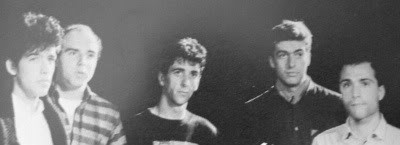Radar Kadafi, one of the most pop-oriented groups in Portugal, emerged in 1984 in Lisbon.
The original line-up consisted of Luís Gravato (vocals), Tiago Faden (bass), Fernando Pereira (guitar), Luís Sampaio (keyboards) and José Bruno (saxophone).
The group’s name was chosen for its participation in that year’s edition of the Rock Rendez-Vous Modern Music Contest. The group began by calling itself Radar; but as the Libyan leader Gaddafi was appearing a lot on television; someone suggested adding it to the name.
The band ranked third in the said Contest. This classification allows them to participate in the compilation edited by Rock Rendez-Vous, with the theme “La Maquina”, sung in Italian.
One of the characteristics of this group, in addition to their melancholy and unapologetically Pop vein, were their live “performances”. The scenic component (which included the presence of a dancer) was very important for the band and, at the same time, distinguished this project from others in the same area.
In 1987 they signed a record contract with the multinational publisher Polygram and recorded the album “Prima Donna”. At the same time, they signed an agency contract with the company Malucos da Pátria.
The original edition of the group’s only full-length, released on vinyl, contains an A-side entirely composed of songs sung in Portuguese [Lusitano] and a B-side with themes in Spanish, Italian and French.
Produced by Ricardo Camacho, the LP contains the themes “40 Graus À Sombra” and “Sei que Não Sou Sincero”, in addition to “Maria” and “Romance da Sereia e do Cupido”. The songs that are not sung in the language of Camões have titles such as “Le Rasoir Qui Tue”, “Brigite Bardot”, “Balade de Torero e Danzarina” or “La Calle”.
In the “booklet” of the disc it can be read that “This album is strongly recommended to all those who are touched by the passion of passion, being suitable to accompany the intoxicating moments in the presence of the loved one”.
The disc was, in 1998, reissued in CD format, so that everyone can check if what is written above is true or not.
The band didn’t manage to survive for a long time because the success was messing with the personalities of the musicians. In November 1987 the group gave its last concert and the chapter of melancholy music and passionate lyrics ended.
Luís Sampaio joined Delfins at the end of 1988. He had previously started a project with Tiago Faden.
Tiago Faden is an executive at Sony publishing house.
Guli devoted himself to architecture.
Luís Gravato is an illustrator and graphic designer.
The saxophonist Zé Nobody even played with Sei Miguel.






A captivating story of a band that blended languages and emotions into their music, leaving a lasting legacy despite their brief journey.
love this group. one of the best!